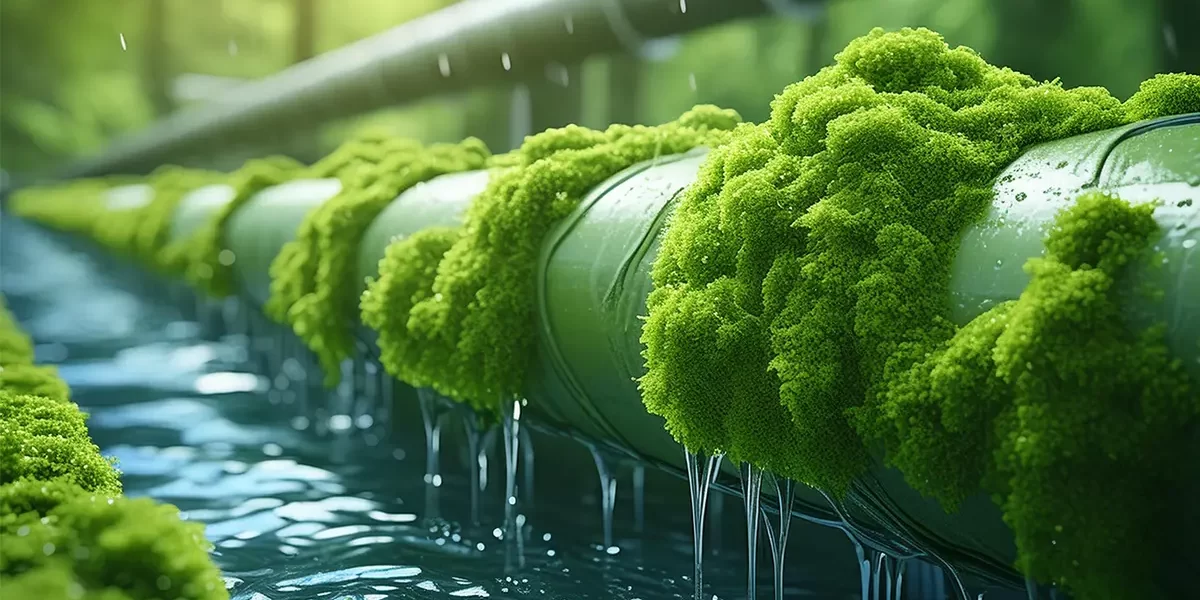Biofilm formation in industrial water systems is a widespread issue that can significantly impact system performance, efficiency, and longevity.
Biofilms, which are communities of microorganisms that adhere to surfaces and produce a protective matrix, can lead to reduced heat transfer efficiency, corrosion, and blockages.
Chlorine Dioxide (ClO2) has emerged as an effective solution for controlling and eliminating biofilm, ensuring better system performance and extending the lifespan of industrial water systems. This article explores how Chlorine Dioxide works and its benefits in managing biofilm in various industrial applications.
Understanding Biofilm and Its Impact
 Biofilm is a complex aggregation of microorganisms, including bacteria, fungi, and algae, encased in a self-produced extracellular polymeric substance (EPS). This matrix protects the microorganisms from environmental stresses and chemical treatments, making biofilm difficult to eradicate. The presence of biofilm in industrial water systems can lead to several issues:
Biofilm is a complex aggregation of microorganisms, including bacteria, fungi, and algae, encased in a self-produced extracellular polymeric substance (EPS). This matrix protects the microorganisms from environmental stresses and chemical treatments, making biofilm difficult to eradicate. The presence of biofilm in industrial water systems can lead to several issues:
- Reduced Heat Transfer Efficiency: Biofilm acts as an insulating layer, reducing the efficiency of heat exchangers and increasing energy consumption.
- Corrosion: Microbial activity within biofilm can accelerate corrosion of metal surfaces, leading to leaks and structural damage.
- Blockages: Biofilm can obstruct pipes and nozzles, reducing water flow and system efficiency.
- Increased Maintenance Costs: Frequent cleaning and maintenance are required to manage biofilm, leading to higher operational costs.
How Chlorine Dioxide Controls and Eliminates Biofilm
Chlorine Dioxide is a powerful oxidising agent that offers several advantages over traditional biocides:
- Broad-Spectrum Efficacy: ClO2 is effective against a wide range of microorganisms, including bacteria, fungi, and algae, ensuring comprehensive biofilm control.
- Penetration of Biofilm Matrix: ClO2 can penetrate the EPS matrix of biofilm, attacking the microorganisms within and disrupting their protective environment.
- Residual Effectiveness: ClO2 provides a residual effect, continuing to control microorganisms and prevent biofilm formation long after initial application.
- Environmentally Friendly: Unlike traditional chlorine treatments, ClO2 does not produce harmful by-products such as trihalomethanes (THMs), making it safer for the environment.
Applications of Chlorine Dioxide in Industrial Water Systems
- Cooling Towers: ClO2 is used to control biofilm in cooling towers, where biofilm can significantly reduce heat transfer efficiency and promote corrosion. Regular dosing with ClO2 keeps surfaces clean and operational.
- Heat Exchangers: In heat exchangers, biofilm can act as an insulating layer, reducing efficiency. ClO2 helps maintain clean surfaces, ensuring optimal heat transfer and energy efficiency.
- Process Water Systems: In various industrial processes, clean water is essential for product quality and system performance. ClO2 effectively controls biofilm in process water systems, ensuring consistent water quality.
- Pipes and Distribution Networks: ClO2 prevents biofilm formation in pipes and distribution networks, reducing blockages and maintaining efficient water flow.
Benefits of Using Chlorine Dioxide for Biofilm Control
- Improved System Performance: By eliminating biofilm, ClO2 enhances the overall performance and efficiency of industrial water systems, leading to energy savings and better productivity.
- Extended Equipment Lifespan: ClO2 reduces corrosion and wear caused by biofilm, extending the lifespan of equipment and reducing the need for frequent replacements.
- Cost Savings: Reduced maintenance and cleaning requirements lead to significant cost savings in terms of labour, chemicals, and downtime.
- Regulatory Compliance: Using ClO2 helps industries meet environmental regulations by preventing the formation of harmful by-products and ensuring safe discharge of treated water.
Chlorine Dioxide is a highly effective solution for controlling and eliminating biofilm in industrial water systems. Its broad-spectrum efficacy, ability to penetrate biofilm matrices, and environmentally friendly profile make it an indispensable tool for enhancing system performance and longevity. Scotmas provides advanced ClO2 solutions tailored to the specific needs of industrial applications, helping businesses achieve optimal water system performance and compliance.
For more information on how Chlorine Dioxide can benefit your industrial water systems, contact Scotmas today. Our experts are ready to provide customised solutions to help you maintain clean, efficient, and long-lasting water systems.






